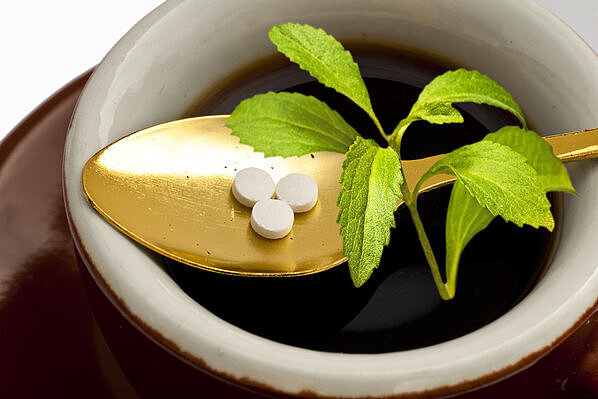Natural sweeteners

What are natural sweeteners?
Natural sweeteners are substances that are derived from plants or other natural sources and have a sweet taste. They are often used as an alternative to sugar or artificial sweeteners as they have fewer calories or do not affect blood sugar levels. Some examples of natural sweeteners are
- Stevia: an extract from the leaves of the stevia plant that is up to 300 times sweeter than sugar.
- Xylitol: A sugar alcohol made from birch bark or corn cobs that has about the same sweetening power as sugar.
- Erythritol: Another sugar alcohol that is fermented from fruit or mushrooms and has about 70% of the sweetness of sugar.
- Honey: A sweet syrup produced by bees from the nectar of flowers.
- Agave syrup: A thick juice extracted from the agave plant that is about 1.5 times sweeter than sugar.
What are the benefits of natural sweeteners for dogs?
Natural sweeteners can have some benefits for dogs, depending on which one you choose. For example:
- Stevia has no calories and no impact on blood sugar levels, which is good for dogs with diabetes or obesity.
- Xylitol can help prevent the formation of plaque and tooth decay in dogs as it inhibits bacteria in the mouth.
- Erythritol also has no calories and a low glycemic index, which means that it only slightly increases blood sugar levels.
- Honey contains antioxidants and enzymes that can boost the immune system and reduce inflammation.
- Agave syrup has a high fructose content, which is absorbed more slowly by the body than glucose and therefore raises blood sugar levels less.
What are the disadvantages of natural sweeteners for dogs?
Natural sweeteners are not always safe for dogs. There are some disadvantages or risks that you should be aware of. For example:
- Xylitol is very dangerous for dogs and can lead to severe poisoning. If your dog eats xylitol, it can cause a sharp drop in blood sugar levels, which can lead to vomiting, weakness, seizures or even death. Xylitol can also cause liver failure. You should therefore keep products containing xylitol away from your dog at all costs.
- Stevia can cause gastrointestinal problems or allergic reactions in some dogs. In addition, stevia is not well researched and it is not clear whether it has any long-term side effects.
- Erythritol can also cause digestive problems such as bloating or diarrhea, especially if your dog eats too much of it.
- Honey can contain bacteria or fungi that can be harmful to your dog, especially if he has a weakened immune system. Honey is also high in calories and can contribute to obesity or tooth decay.
- Agave syrup has a lower glycemic index than sugar, but is still high in fructose, which can put a strain on the liver. Agave syrup can also lead to obesity or tooth decay.
Natural sweeteners are not all the same and have different effects on your dog. While some sweeteners like stevia or erythritol are relatively safe, others like xylitol are extremely dangerous. You should therefore always check the ingredients list of products before giving them to your dog. You should also only give your dog small amounts of natural sweeteners and be aware of possible side effects.
If you notice any signs of hypersensitivity or poisoning in your dog, you should see your vet immediately. We are not a substitute for a vet, but we try to be as accurate as possible. Every dog reacts differently and we recommend you get a second opinion or consult your vet if in doubt.
Stay healthy and take good care of your four-legged friend!😊
Similar to Natural sweeteners
Stevia is an extract from the leaves of the Stevia rebaudiana plant, which is native to South America. The leaves contain steviol glycosides, which are up to 300 times sweeter than sugar but have no...
Honey is a natural product made by bees from the nectar of flowers or the honeydew of plants. The bees collect the nectar or honeydew, carry it in their honey stomachs to the beehive and pass it on...
Agave syrup is a thick syrup made from the sap of the agave plant. The agave plant is a succulent that grows in dry and warm regions such as Mexico or South America. The sap is pressed from the...
What is maple syrup? Maple syrup is a natural sweetener obtained from the sap of the maple tree. This sap is collected and then concentrated by heating, creating the characteristic golden syrup. It...



